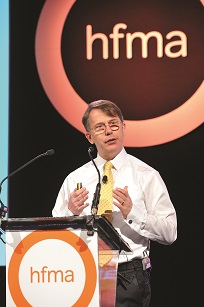News / NHS England intervenes to minimise saving risk impact
 NHS England is monitoring financial risks and available mitigations. At month four, it said £370m of net risk was being reported, excluding the benefit of the risk reserve.
NHS England is monitoring financial risks and available mitigations. At month four, it said £370m of net risk was being reported, excluding the benefit of the risk reserve.
‘The CCG risk, which is similar to the level of risk we were reporting at this point last year, feels very real to me and last year it proved to be a pretty accurate predictor of what happened to the forecast in the succeeding months. So we are taking it very seriously,’ he said.
Mr Baumann explained that the risk reflected two main issues. While activity was substantially below the 3% growth that providers had planned, there has been a significant rise in the cost per case of admitted patients.
The second issue relates to the ambitious savings plans set out by CCGs this year. They are expecting to deliver an aggregate £2.9bn in savings this year, compared with just under £2bn last year, which was unprecedented.
‘Much of this increase is in the more transformational programmes related to the Five-year forward view rather than more transactional savings,’ said Mr Baumann (pictured).
‘Inevitably, some are struggling to deliver these ambitious plans. On average, the success rate is running at about 91% year-to-date and is currently forecast to rise slightly over the coming months. But the plans are weighted towards the end of the year and carry significant risk, not least because they depend on the full collaboration of providers – who are, in many cases, struggling to deliver the required financial performance.’
Mr Baumann outlined six steps NHS England was taking to stop the risks leading to a deterioration in the financial position. These included support for CCGs in constructing and strengthening their efficiency plans – particularly for the 70 CCGs with the greatest challenges – and rolling out a menu of opportunities that describe more than 150 of the most successful efficiency programmes.
At month four, the commissioning sector had underspent by £46m (year-to-date) and forecast a £9m underspend at the end of the financial year. The year-end position does not include the £580m uncommitted risk reserve being held by NHS England and clinical commissioning groups.
CCGs had slightly overspent against plan (£58.5m or 0.2%), but were forecasting to all but hit their year-end plan, with an overspend of just over £17m.
However, below the line, there is greater pressure than expected (£71m more than planned in the full year). This is the result of technical and ring-fenced adjustments relating to provision movements and depreciation.
Mr Baumann said: ‘There’s a pattern of CCGs forecasting these sort of movements in provision at the start of each year and revising it as they get better information towards the end of the year. I would anticipate that particular issue will improve as the year goes by.’
The technical adjustments are more than offset by forecast underspends in NHS England central programme and running costs (£97m) and direct commissioning (£0.3m).
The former is made up largely of almost £89m in programme costs underspends (including £86m of unplanned income) and £8.5m in NHS England running costs.
Related content
We are excited to bring you a fun packed Eastern Branch Conference in 2025 over three days.
This event is for those that will benefit from an overview of costing in the NHS or those new to costing and will cover why we cost and the processes.